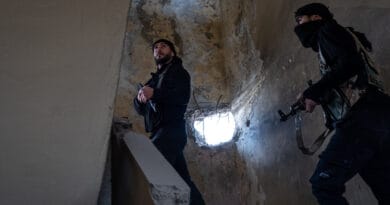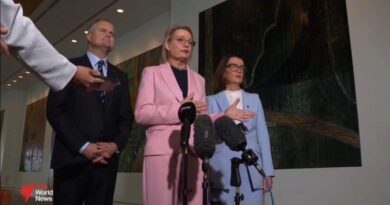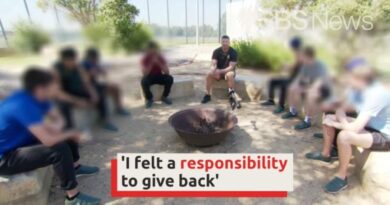Horrific allegations of abuse have put a spotlight on the childcare sector and sparked calls from some advocates for men to be banned, but others say “fear-driven policies” aren’t the way to address “real failures” within childcare settings.
A national debate has raged since Tuesday when it emerged Joshua Dale Brown was charged with more than 70 sex offences.
The 26-year-old, who worked at 20 childcare centres across Melbourne from 2017 to 2025, has been accused of abusing eight children aged under two at a facility in the city’s south-west.
Brown was not known to Victoria Police until the start of the investigation, there were no formal complaints against him and he had a valid working with children check.
Some have called for men to be banned from the profession entirely — something Ramesh Shrestha labels a discriminatory, knee-jerk reaction.
What measures are needed?
Shrestha is the founder and president of Thriving Educators Aspiring Male Professionals — a professional association representing men in the childcare sector.
Shrestha — who no longer works at childcare centres, trains early childhood educators — said he was disturbed by the news and understood there was fear and anger, especially among families with young children.
But he said measures such as banning male educators from nappy change and toileting duties, as provider Inspire Early Learning Journey with 16 centres is reported to have done, are “fear-driven policies” that won’t tackle “real failures” within the sector.
“The safest environments are built through rigorous screening, effective supervision, transparent reporting, and a culture that empowers children to speak up, none of these safeguards depend on excluding people purely because they are men,” he said.
Ramesh Shrestha runs a group for male child care workers and says children deserve to have responsible, caring, male role models as part of their care. Source: Supplied
He said such measures unfairly stigmatised thousands of dedicated, professional male childcare workers and would contribute to some men leaving the already short-staffed sector.
“I can already see that pattern in our group. People are thinking of career change.”
He said male childcare workers had already felt greater scrutiny around their roles.
Shrestha said many already “sought out an extra layer of security” when undertaking these duties by going out of their way to ensure they were not alone with children in such situations.
“Now it has elevated to a point where a large provider has banned male educators from changing nappies and toileting children, the negative impact of that is, I think it will build a lot of resentment from our female colleagues, because they would be carrying a lot of workload and responsibility,” he said.
Inspire Early Learning Journey has not commented publicly about the policy, but a number of comments have been left on the provider’s Facebook page about the measures believed to have been communicated via letters to parents.
SBS News has contacted Inspire Early Learning Journey for comment.
Shrestha said while it was best practice for nappy changing and toileting to occur in view of two staff members, due to staffing issues and depending on rations in a centre at any one time, it may not always happen that way.
Men feel ‘highly surveilled and monitored’
Martyn Mills-Bayne is a senior lecturer in early childhood education at the University of South Australia. Once an early childhood teacher, he is now in academic research and have spent almost 20 years mentoring men in the sector.
Writing in The Conversation this week, he said while some people’s deep suspicion of men working closely with children is “totally justified” in light of the recent allegations, there are many “innocent, well-intentioned and caring men” in the sector — and driving them out of the workforce would be a mistake.
He wrote male childcare educators make up an estimated 2-4 per cent of the workforce, and those he has spoken with feel as though they are “highly surveilled and monitored” and are “extremely aware of protecting children and themselves”.
“They talk about trying to make sure they’re never alone with children and use distancing strategies to keep themselves safe and in full view of colleagues and parents,” he wrote in The Conversation.
“If they’re changing nappies, they do so in open spaces, where others can see them. If a child is hurt or needs support, they often think twice about the most appropriate way to provide it.”
The vast majority of early childhood educators are women and some say further stigmatising could see the number of men in the industry decrease further. Source: Getty / Rawpixel
He, like Education Minister Jason Clare, says there are no easy fixes to problems in the childcare sector, but says strengthening working with children screening checks could help. He also said there should be measures to ensure no education, regardless of gender, is ever alone with a child.
“The Royal Commission into Institutional Responses to Child Sexual Abuse highlighted the need to make sure the physical environment minimises opportunity for abuse to occur,” Bayne wrote in The Conversation. “This includes glass walls around toilet and nappy change areas and no blind spots in centres.”
Shrestha said tougher screening processes should be implemented for those obtaining childcare qualifications and improving staff to child ratios are among the areas that need to be improved to increase safety for children.
“There needs to be a greater deal of transparency and accountability,” he said.
He said while it may been considered controversial to some, he supported the use of CCTV cameras in childcare centres to provide a layer of transparency to protect children. This is something Clare has said early education ministers will discuss when they meet next month.
‘We need to set up a system that is safer’
The education minister also pushed against calls to ban men from working as early childhood educators, pointing to separate allegations involving female workers.
And the United Workers Union’s director of early childhood education Carolyn Smith said she was worried about the impact of the case on the perception of men in early education, their participation in the workforce and the flow-on effects of losing any strong male role models.
“We need to set up a system that is safer, rather than targeting a gender or a particular group of workers,” she said this week.
“Their top priority should be the safety of our children,” she told the ABC’s Insiders program.
Clare acknowledged this week that reforms had taken “too bloody long”.
The Opposition has promised to support any reforms that would help protect children as the government prepares to expedite its childcare safety legislation when parliament returns on 22 July.
The Victorian government also unveiled its own reforms, which include a register of childcare workers and educators, a ban on personal mobile phones in centres and mandatory CCTV.
Changes to working with children checks will be discussed at the next meeting of state and territory attorneys-general, and a national childcare safety crackdown is under way with the first stage focusing on stricter recommendations for photography, filming and mandatory reporting rules.
Federal government frontbencher Kristy McBain said it was vital to make sure parents had trust in the system.
“There’s some work to do here, but we will work really hard because what we’ve seen afforded is every parents’ worst nightmare.”
With additional reporting by the Australian Associated Press.
Readers seeking support can ring Lifeline crisis support on 13 11 14 or text 0477 13 11 14, Suicide Call Back Service on 1300 659 467 and Kids Helpline on 1800 55 1800 (for young people aged 5 to 25). More information is available at beyondblue.org.au and lifeline.org.au.
Anyone seeking information or support relating to sexual abuse can contact Bravehearts on 1800 272 831 or Blue Knot on 1300 657 380.







